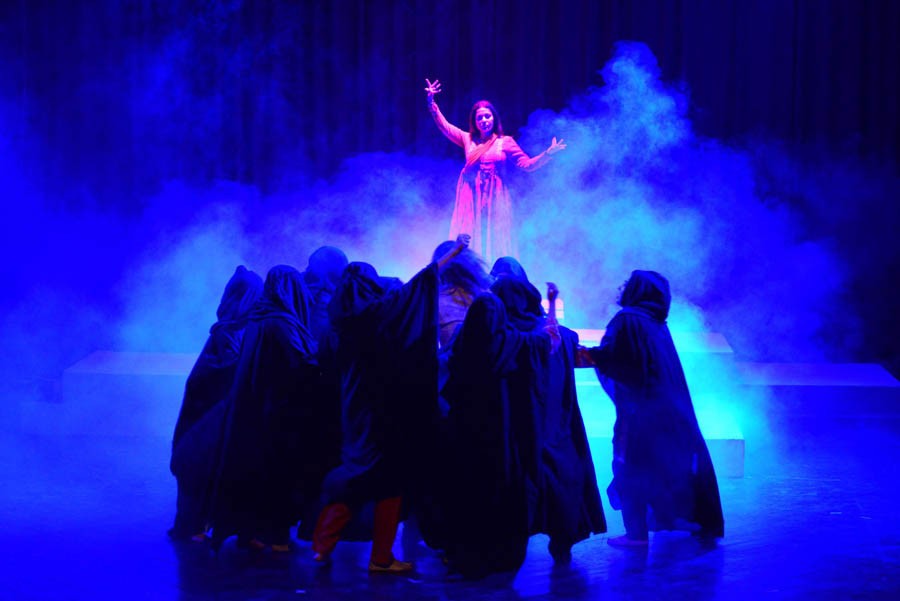
Judging the play independently from the tenor of the entire Asma Jahangir conference was impossible. The performance was scripted especially for the event, acting as the perfect dovetail

Ajoka theatre’s play Saira and Maira written and directed by Shahid Nadeem, premiered at the Alhamra on October 19, as evening entertainment for the-two day Asma Jahangir Conference. There could not be a better occasion to stage a play centered upon all Jahangir stood for her entire life. Her undaunting spirit and iron will live on, as this event proved.
Judging the play independently from the tenor of entire the conference was impossible. The performance was scripted especially for the event, acting as the perfect dovetail. Had it been staged independently, then perhaps one could say it was not closely linked to the person of Asma Jahangir and the conference held to pay tribute to her contributions to human rights, democracy and civil liberties.
The play was staged under the auspices of the AGHS, an organization that was started by Ms Jahangir and her equally valiant sister Hina Jillani for the protection of women without education, family support, economic sustenance, religion guarantees and social cover. This testifies to the totally illustrative character of the enactment that was presented to an audience already responsive and appreciative of the effort.
Saira and Maira were two women thrown together by the commonality of circumstances; driven to the margins because they wanted to exercise their freedom to be; what they wanted for themselves, and the men they desired to marry. Though from different backgrounds; when the crunch came to exercising their choices and freedom they were faced with the same obstacles. In other words, the obstacles for women are more or less of similar nature, despite hailing from various classes, ethnic groups and regions.
The play progresses through the stacking of obstacles juxtaposed to their resistance. Both their lives were fraught with threats to life and property. In the end Saira was killed by her extended family, abetted by her mother in the name of honour. Maira though with the man she desired, had to leave the country for the sake of survival. Neither of them truly got what they wanted, or deserved.
Most action in the play was situated in a shelter home established for women seeking refuge and protection from their families and close associates. These antagonists manipulate the legal and state apparatus to their use, forcing their narrative through the media to form public opinion. The latter was indeed caricaturised unlike other characters. Other characters seemed in deadly earnest - whatever their opinion, role and stance - unlike the media, which was portrayed as being up for sale, only playing to the tune of monetary gains, lacking in its own convictions.
This play was derived from a plethora of incidents - some bloody, some not - that organisations which Jahangir was connected to dealt with. However it was not fully representative of the scale of her crusade. Her struggle cannot be limited to one geographical area or field; rather it encompassed many crucial issues which bedevil our society on the whole.
Perhaps it would have been more fruitful, if instead of one full play, a number of smaller episodes or enactments had been put together for a more representative example of Asma Jahangir’s rollercoaster life.
We have witnessed, in our society - which has an inconsistent tradition of theatre - the arrival of some group or person announcing a theatrical revolution, calling all that happened before as redundant, passé, or reeking of a worldview deemed irrelevant.
Though written and directed by Shahid Mehmood Nadeem, the most heartening aspect was that the play was staged by actors and stage hands who have been associated with the Ajoka Institute, a body which trains people in the finer aspects of drama. Naseem Abbas who was the assistant director and also looked after the music arrangement is another old Ajoka hand, as were the group of musicians, who created the ambience for the action on stage to become palatable. In the hands of Nirvaan Nadeem one can look forward to it achieving even more positive outcomes.
This is probably a better way of staging and planning for a theatre troupe. As the baton passes from one generation the next, these pivotal transitional periods are where both age groups work together. Ensuring that the experience and wisdom of the older is supplemented by vigour and volatility of the young.